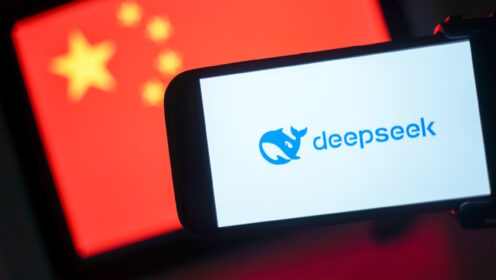by Robert H. Bork, Jr.
China’s AI breakthrough shook Wall Street, but U.S. regulators may still be chasing the wrong enemy.

What a difference a trading day makes.
On Friday, Wall Street went to bed confident that the United States had a commanding lead in artificial intelligence. After all, Nvidia makes the world-leading chips on which to create cutting-edge AI, while the U.S. government has forbidden the export of such chips to America’s near-peer competitor, China.
On Monday, U.S. equity markets plunged $1 trillion in valuation after it became widely known that DeepSeek, a small Chinese startup, ran rings around the AI invented by blue-chip American tech companies and their $1 trillion investment in this technology. This bolt from the blue was not an extinction-level asteroid, but for Nvidia, Google, Microsoft, and other U.S. giants it did cast shadows that looked suspiciously large, fat, and a bit saurian.
Later in the day, markets calmed a bit with the assurance that China will soon run out of Nvidia chips and that the purported $6 million investment by DeepSeek in its technology could mask deeper investments by Beijing. (Perhaps the phrase “Chinese accounting” deserves to become the next infamous euphemism.) But the magnitude of this event should not be denied. A country capable of producing DeepSeek is probably capable of mounting a challenge to overcome other obstacles in front of it, perhaps matching the best chips Americans can make, or more likely securing reliable backdoor access to them in global markets. This is especially true given the likelihood that China’s leader Xi Jinping is driving this project as part of his campaign to best the United States.
This competitive threat from China is not likely to be underestimated in Palo Alto and Seattle. But a hubristic threat remains in Capitol Hill and the Federal Trade Commission in Washington, D.C., as well as among regulators in Brussels and London. While American companies adjust to an unexpected competitive threat from a hostile nation, many continue to treat American Big Tech as an indestructible feature of the global market.
Tilting at the wrong target is an antitrust tradition. Consider the Justice Department antitrust suit against IBM that began at the height of the Vietnam War in the late 1960s and was called off in the early Reagan era. The IBM case was deemed “without merit” when it became obvious that the leadership of the computer industry was shifting, with nimble little mammals such as Microsoft and Apple scurrying at the feet of the giant. Far from clearing space for competitors, Justice’s lawsuit narrowed IBM’s market share only temporarily, raising computer prices and perhaps delaying innovation.
Given the lineup of tech billionaires at Donald Trump’s second inauguration, it might seem like this threat has receded. But that sanguine attitude overlooks three factors that threaten to harm U.S. technology and enable China. One is the weaponization of the Federal Trade Commission. Former FTC Chair Lina Khan drove off the experts from her agency, up to 71 senior attorneys in 2021-2022. I am told by FTC insiders around 25 percent of senior staffers were driven off. Those with the most expertise and appreciation of antitrust’s tradeoffs were replaced by young staffers drawn from the ranks of left-wing NGOs and universities.
Another factor is the buy-in of Khanservatives like Sen. Josh Hawley of the FTC’s leftist antitrust agenda, often in league with progressive senators like Elizabeth Warren and Amy Klobuchar. Sen. Hawley has gone so far as to propose outlawing all mergers and acquisitions by any large American company. It remains to be seen if new Republican Commissioner Mark Meador, who has spoken of a “paradigm shift” among conservatives, will resist or enable the newly weaponized FTC.
Then there is Europe. President Trump complained by video to Davos that he regards the European Union’s hefty fines on American tech companies as “a form of taxation.” It is more like strangulation. Europe’s Digital Markets Act is predicated on a theory that “gatekeepers”—almost all of them American companies—must adhere to complex rules that forbid customary business practices, such as not preferencing one’s own products and making digital platforms interoperable with competitors. In other words, Brussels (and a me-too London) wants America’s most innovative companies to operate like utilities. To enforce this, the EU can levy fines of up to 10 percent of a company’s global revenues, and 20 percent for repeat offenses. Even for large companies, fines of this magnitude approach the death penalty.
The Trump Administration is now weighing whether to continue the lawsuits it inherited from the Biden era against Amazon, Apple, Google and Meta, all of them riddled with novel legal theories and often illogical economic reasoning. President Trump should heed the words of the great, late Herbert Stein, who said that if something can’t go on forever, it will stop—such as the end of America’s tech dominance enabling the rise of China.
***
Robert H. Bork, Jr. is president of the Antitrust Education Project.
Source: https://amgreatness.com/2025/02/01/will-chinas-deepseek-and-the-eus-antitrust-holy-war-drive-u-s-big-tech-to-extinction/
No comments:
Post a Comment